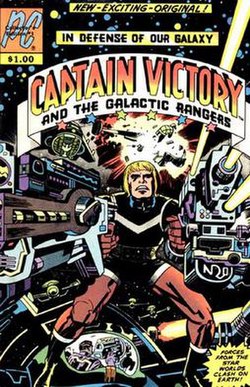Publication history
One of Pacific Comics' first titles, the original run of Captain Victory and the Galactic Rangers lasted thirteen issues, plus a special, through January 1984. All were written, illustrated, and edited by Jack Kirby. [2]
In the last issues of the Pacific series, Kirby crafted an origin story for Captain Victory which he tied into the New Gods comic book that he had written and drawn for DC Comics in the 1970s. It was suggested that Victory was the son of the New God Orion. Orion was not specifically named, but a number of clues were planted, including equipment said to belong to Victory's father that was identical to the Astro-Harness ridden by Orion. Additionally, Victory's grandfather, Blackmaas, was illustrated only as a cast shadow, but a shadow that to many readers bore a resemblance to Orion's father Darkseid. [3]
After the end of Pacific, no more was seen of Captain Victory until Topps Comics attempted to revive the character as part of a planned five-issue mini-series. It only lasted one issue (Victory #1, June 1994) before Topps cancelled all of the 'Kirbyverse' books in 1994. This issue was a part of a more complex project named Secret City Saga.
TwoMorrows Publishing created a 'graphite edition' reprint of the first Captain Victory issue. The edition, in TwoMorrow's words, "presented [Captain Victory #1] as it was created (before it was broken up for the later Pacific Comics series), reproduced from copies of Jack's uninked pencils!"
In 2000, Jack Kirby's grandson Jeremy Kirby launched Jack Kirby Comics, the fledgling company's only offering being a three-issue retelling of Captain Victory, reordered and rescripted by Jeremy.
In 2006, a new series was published, based on rejected character sketches for the Wonder Warriors. [4] Jack Kirby's Galactic Bounty Hunters was co-written by Kirby's daughter Lisa and is creator-owned by her under Marvel's Icon imprint. Captain Victory and the Galactic Rangers guest-starred in issue #3 of the six-issue limited series.
In late 2011, Dynamite Entertainment started a new series under the Kirby: Genesis title, which used many of Kirby's created and owned characters (many unpublished), including Captain Victory. This led, in November 2011, to a new Captain Victory title which lasted six issues. It was later collected into a trade paperback.
A new continuing series, Captain Victory and the Galactic Rangers, written by Joe Casey and published by Dynamite Entertainment, began in August 2014. [5] It ran for 6 issues and was collected into a trade paperback in 2016.
This page is based on this
Wikipedia article Text is available under the
CC BY-SA 4.0 license; additional terms may apply.
Images, videos and audio are available under their respective licenses.
